

Super Position. I.
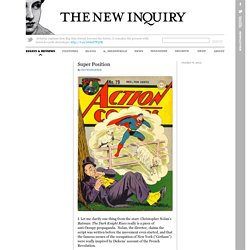
Let me clarify one thing from the start: Christopher Nolan’s Batman: The Dark Knight Rises really is a piece of anti-Occupy propaganda. Nolan, the director, claims the script was written before the movement even started, and that the famous scenes of the occupation of New York (“Gotham”) were really inspired by Dickens’ account of the French Revolution.
This is probably true, but it’s disingenuous. Everyone knows Hollywood scripts are continually being rewritten while movies are in production, and that when it comes to messaging, even details like where a scene is shot (“I know, let’s have the cops face off with Bane’s followers right in front of the New York Stock Exchange!”) Or a minor change of wording (“let’s change ‘take control of’ to ‘occupy’”) can make all the difference. Support TNI. It’s sad, because both Batman Begins and The Dark Knight had moments of genuine eloquence. II. In a way, this makes sense. III. It doesn’t take a genius to figure out what’s going on here. IV. Science journalism. Science journalism conveys reporting about science to the public.
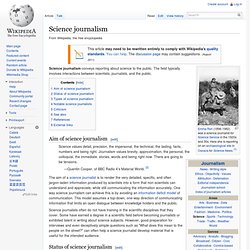
The field typically involves interactions between scientists, journalists, and the public. Aim of science journalism[edit] Science values detail, precision, the impersonal, the technical, the lasting, facts, numbers and being right. Journalism values brevity, approximation, the personal, the colloquial, the immediate, stories, words and being right now. There are going to be tensions. The aim of a science journalist is to render the very detailed, specific, and often jargon-laden information produced by scientists into a form that non-scientists can understand and appreciate, while still communicating the information accurately.
Science journalists often do not have training in the scientific disciplines that they cover. The eternal tug of war between science journalists and scientists. A graphical story. I am always disappointed by the media coverage on my research area.
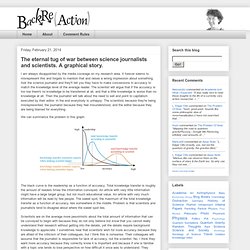
It forever seems to misrepresent this and forgets to mention that and raises a wrong impression about something. Ask the science journalist and they'll tell you they have to make concessions in accuracy to match the knowledge level of the average reader. The scientist will argue that if the accuracy is too low there's no knowledge to be transferred at all, and that a little knowledge is worse than no knowledge at all. Nine ways scientists can help improve science journalism. We propose, in no particular order, nine possible ways scientists can improve science journalism and nine possible questions for science journalists.
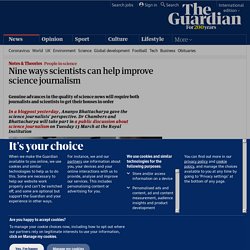
We are calling on Guardian readers to help us triage these to the top three in each list, which will then be discussed at the upcoming Royal Institution debate on Tuesday 13 March. So please help us by commenting on our article and it would be helpful if you would also tell us your profession. You can find many of the points raised here elaborated at our companion website. If you are a scientist, please also take our anonymous 10-minute survey on science and the media. Nine ways scientists demonstrate they don't understand journalism. @mjrobbins. Trial by error. How bad is mainstream science reporting?
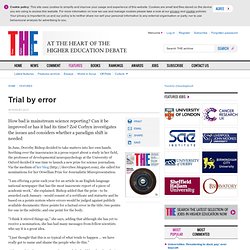
Can it be improved or has it had its time? Zoë Corbyn investigates the issues and considers whether a paradigm shift is needed In June, Dorothy Bishop decided to take matters into her own hands. Seething over the inaccuracies in a press report about a study in her field, the professor of developmental neuropsychology at the University of Oxford decided it was time to launch a new prize for science journalism.
Futurity.org. @FuturityNews/ The Conversation: In-depth analysis, research, news and ideas from leading academics and researchers. Orwellian prize for journalistic misrepresentation. I am offering a prize each year for an article in an English-language national newspaper that has the most inaccurate report of a piece of academic work.
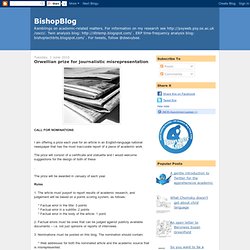
The prize will consist of a certificate and statuette and I would welcome suggestions for the design of both of these The prize will be awarded in January of each year. Rules 1. The article must purport to report results of academic research, and judgement will be based on a points scoring system, as follows: * Factual error in the title: 3 points * Factual error in a subtitle: 2 points * Factual error in the body of the article: 1 point 2. 3. . * Web addresses for both the nominated article and the academic source that is misrepresented. * Name and email contact of the nominator.
Science journalism versus science communication. Quality control. Associations of science journalists. Events. TV - Radio. Specialists. News-papers. Blogs. Science related organisations. Awards. Wetenschap in de wetenschap dat… Aflevering 1. VIDEO: Union of Concerned Scientists Calls Out News Corporation for Overwhelmingly Misleading Coverage of Climate Science. Union of Concerned Scientists calls out News Corporation for overwhelmingly misleading coverage of climate science On September 21, 2012, the Union of Concerned Scientists hand-delivered nearly 20,000 postcards to News Corporation's New York headquarters calling on News Corp. to stop misleading its audience about climate science.
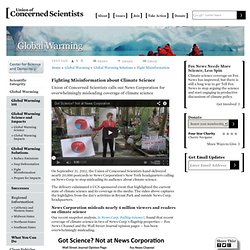
Is dit nou goede wetenschapsjournalistiek? - Daniel Lakens. Als promovendus volgde ik ooit een cursus over hoe je artikelen moet ‘peer reviewen’.
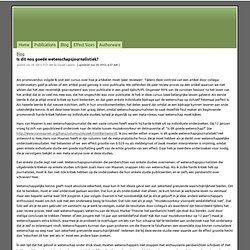
Tijdens deze controle van een artikel door collega-onderzoekers geef je advies of een artikel goed genoeg is voor publicatie. We oefenden dit peer review proces op een artikel waarvan we niet wisten dat het zeer recentelijk geaccepteerd was voor publicatie in een goed tijdschrift. Ongeveer 90% van de cursisten besloot na het lezen van het artikel dat er zo veel mis mee was, dat het ongeschikt was voor publicatie.